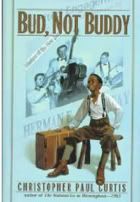
Bud, Not Buddy
by Christopher Paul Curtis
This book won the 2000 Newbery Medal for "the most distinguished contribution to American literature for children" and the award is well-deserved.
Set in Flint and Grand Rapids Michigan in 1936, the story covers three tumultuous days in the life of Bud Caldwell, orphan, age 10. Bud's single mom died when he was six and he has lived in the orphanage and various foster homes since. Bud's already wise to the system. So wise that he can feel sorry for the six-year-old who's being sent to a foster home in the most recent "deployment" from the orphange.
...Six is a real tough age to be at. Most folks think you start to be a real adult when you're fifteen or sixteen years old, but that's not true, it really starts when you're around six.
It's at six that grown folks don't think you're a cute little kid anymore, they talk to you and expect you to understand everything they mean. And you'd best understand too, if you aren't looking for some real trouble, 'cause it's around six that grown folks stop giving you little swats and taps and jump clean up to giving you slugs that'll knock you right down and have you seeing stars in the middle of the day. The first foster home I was in taught me that real quick.
(If that doesn't break your heart, what will?) To cope with his world in which children must be "too wise, too soon", and can't trust any adult, Bud has composed "Bud Caldwell's Rules and Things for Having a Funner Life and Making a Better Liar Out of Yourself". Sprinkled randomly throughout the book (#3, #63, #29, #16 etc), they're a melange of timeless childhood advice, hilarious reasoning, and poignant realizations.
Bud's busting out of the padlocked shed his newest foster parents have locked him in, and he's off to find his unknown father. When she died, his mother left a half-dozen small stones inscribed with letters and numbers, and five different flyers for the jazz band Herman E. Calloway and the Dusky Devastators. Bud is convinced that Herman E. Calloway is his father.
This is a young adult book that will be enjoyed by adults and adolescents alike. Bright and polite Bud narrates his own story and, although he relates the precarious position of an orphan during the Great Depression, he never sounds like he feels sorry for himself. Life is full of unpleasant situations but with his self-authored book of "Rules and Things...", he can find a way to deal with anything. You'll be uplifted by his story.
I rate Bud, Not Buddy



